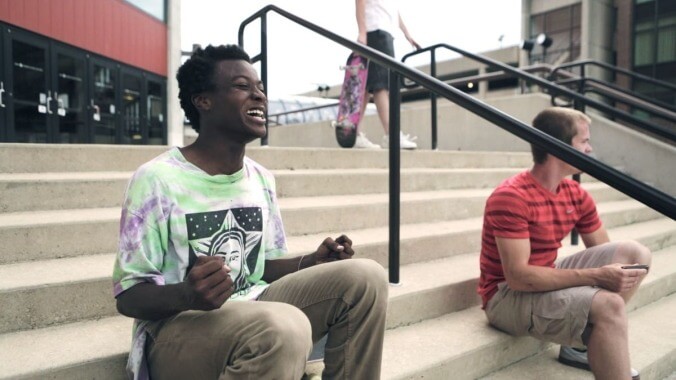Skateboarding is an escape, but not a solution, for the traumatized subjects of Minding The Gap

Director Bing Liu intimately understands how skateboarding represents a community and an escape. As a teen, Liu shot countless amateur skate videos with his friends, capturing how the sport bonds disparate youths together, crossing racial and social lines (but, crucially, not economic ones, at least in his hometown of Rockford, Illinois), and provides a raison d’être for aimless adolescents. Yet his debut, the vérité documentary Minding The Gap, doesn’t merely wax rhapsodic about skateboarding’s therapeutic potential. Instead, it demonstrates how the activity functions as a tonic for battered souls. For Liu and friends Zack and Keire, the film’s primary subjects, skateboarding became an active diversion from home lives mired by domestic abuse and violence. It was a way to reclaim ownership of their own bodies, which were otherwise controlled by the whims of the troubled adults in their lives. Bruised skin and broken bones are the unfortunate byproduct of flying so close to the ground, but at least they’re not from the hands of a rotating cast of would-be father figures.
Liu cleverly buries this lede in Minding The Gap, which he staunchly refuses to turn into a run-of-the-mill “issue doc,” even when grappling with the shared suffering at the heart of the film. He begins by introducing Zack and Keire as charismatic, confident kids on the brink of adulthood—Zack and his girlfriend Nina prepare to become parents, and Keire seeks employment as he turns 18—but slowly reveals how their childhoods ripple out into their adult lives. Amidst meandering footage of hangouts, aided by copious amounts of beer and pot, Liu catches glimpses of internal struggles and toxic behavior. Soon, skating recedes into the distance entirely and real-life responsibility takes precedence, forcing Zack, Keire, and Bing himself to confront ugly truths about their past, if only to stem the tide of cyclical abuse. It’s a sight to behold, the way Minding The Gap organically evolves from a meditative portrait of skateboarding—complete with gorgeously fluid Steadicam shots of boarders ripping down city streets—into a nuanced character study of repressed trauma.
Minding The Gap doesn’t buy into the reductive idea that self-awareness begets growth; the former is presented instead as a necessary first step on a journey that might go uncompleted. Keire, a black kid living in the Rust Belt who hangs out mostly with white kids, constantly interrogates his own racial identity and his relationship with his dead abusive father. He struggles with contradictory feelings about his childhood, but Liu illustrates how Keire’s refusal to dismiss his own pain has placed him on the path toward stability. Zack, on the other hand, doesn’t as deeply explore his own emotional issues, which Liu suggests is responsible for myriad troubles in his adult life. The director paints Zack and Nina’s initial fights as standard-issue domestic squabbles, but things take an uncomfortable turn when Nina reveals that Zack has been reenacting abusive behavior from his own childhood. It’s one thing to acknowledge the problem. It’s another thing entirely to actually fix it.
Liu eschews neat character arcs and tidy conclusions, instead depicting how certain patterns emerge between people who are born in shared environments. He eventually implicates himself in Minding The Gap by interviewing his mother about their violent home life at the hands of his stepfather, and while that’s emotionally affecting in its own right, it also serves to provide a fuller portrait of troubled domesticity. (Similarly, when Liu brings Nina into the film, he crafts a more balanced collection of voices, all of whom reject traditional characterizations of victimhood while still exhibiting their emotional scars.) Not all of Liu’s choices bear fruit—shots of billboards that cheekily comment on the film’s themes are too on the nose—but his decision to bring himself into the proceedings never once scans as indulgent. In fact, it generates a sense of personal immediacy that elevates Minding The Gap above the confines of mere portraiture; his presence facilitates (and sometimes hinders) honest admissions from his subjects. Skaters might form a makeshift family on the streets, but dysfunction abounds, no matter how much they try to outrun it.